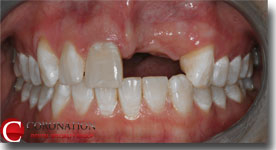Services > Implants > Dental Implants
One of the options to replace missing teeth is a dental implant. First applied to the dental field by Dr. Per-Ingvar Brånemark, the ensuing decades have proven that dental implants are a viable and reliable treatment option.
What is a Dental Implant?A dental implant is a post that replaces the root of a tooth, beneath the gums. A crown (tooth) is secured to the implant, and is used for chewing and smiling. The implant and crown function and look like the root and crown of a natural tooth. There are also options to replace missing teeth. However, depending on the situation, dental implants can be advantageous. |
|
Probably, but it depends! When evaluating someone for dental implants, it is important to perform a full clinical and radiographic examination and history.
First, it is important to start with a patient’s health history. Certain medical conditions (like diabetes), habits (like smoking), or medications (like bisphosphonates) may affect the healing of dental implants. In some cases, we may advise that dental implants are not a good option, if there are clues from the history that implants would not be successful.
 | Next, a full evaluation of the teeth and gums is completed. It is important to ensure that the surrounding teeth and gums are healthy, as these can have an effect on the health of dental implants. An evaluation of the remaining bone is also performed, to ensure that the implant will have proper stability and bone coverage when placed. In some cases, bone grafting may be required. |
It is also important to take proper x-rays prior to implant placement. The most common are:
PA (periapical)
PAN (panorex or panoramic)
CBCT (cone beam computed tomography aka CAT scan)
The type of x-ray taken depends on the tooth being replaced, and on the clinical evaluation. X-rays can give an idea of the health of the bone in the area, the condition and position of the adjacent teeth, and the distance to adjacent anatomic structures (eg nerves, or the sinus). In addition, CT scans can look at the remaining bones in three dimensions, and in some cases can be used to plan the implant surgery on the computer, before any actual surgery is completed on the patient. When prescribing x-rays, we follow the ALARA principle – As Low As Reasonably Achievable. That means that we prescribe only the x-rays that are required to help with the surgery, in an effort to minimize radiation exposure to the patient.
Dental implant surgery is usually very straightforward. In some cases the patient may request, or we may suggest, sedation for implant placement. In other cases treatment may proceed while the patient is awake.
Patients will go home afterwards with written instructions, and usually a prescription for antibiotics and pain medication. Pain afterward is usually reasonable – most patients are surprised at how comfortable they feel.
Dental implant treatment varies between 2-3 months, up to 9-12 months. The different timing depends on what procedures need to be done, and the length of time required for healing. The best way to see what is involved and how much time is required would be to speak with your dentist, or to contact us and request a consultation for implant treatment.
Please find more information regarding: